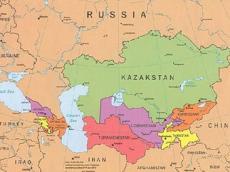Today.Az » Analytics » Central Asia in 2013: No news is good news
27 December 2013 [15:45] - Today.Az
 Summarizing the outcome of 2013, one can say that for the Central Asian states the year brought almost nothing except small scale developments, but for the region's sensitive countries sometimes "No news is good news."
Summarizing the outcome of 2013, one can say that for the Central Asian states the year brought almost nothing except small scale developments, but for the region's sensitive countries sometimes "No news is good news."
Let's have a closer look at what happened in Tajikistan, Uzbekistan, Kyrgyzstan and Turkmenistan, and try to estimate what can happen there in the upcoming year.
UZBEKISTAN: Who will succeed Islam Karimov?
"Uzbekistan was virtually unchanged in 2013," U.S. expert on the Central Asian countries Bruce Pannier believes.
"However, the government shows no signs of changing any policies," he added.
For today, the biggest questions in Uzbekistan is who will take over the country. Uzbek president Islam Karimov will be 76 by the end of January 2014, and rumors about his health have been floating around for several years already. Bruce Pannier says it is unclear who will succeed Karimov.
The Uzbek government is likely to tighten control in the country in the next two or three years as foreign forces in Afghanistan will withdraw and Afghan security forces take over most of the fighting, he said.
"The Uzbek government is most afraid of its own militants returning from Afghanistan and Pakistan," expert added.
TAJIKISTAN: Possible security problems
Tajikistan's situation is not really different from Uzbekistan's.
"President Emomali Rahmon just won another seven-year term in office, but Tajikistan more than any other Central Asian country, is probably going to face security problems as the situation in Afghanistan changes," Pannier said.
"The Afghan government staged several large security operations in areas adjacent to Tajikistan in 2013 and Tajik officials are well aware of that, and the fact that many of the militants that Afghan government forces fought with in those regions were people from Central Asia, not Afghan or Pakistani Taliban," expert added.
KYRGYZSTAN: Will the government stay or will it go?
Considering Kyrgyzstan's earlier experience of holding revolutions, the country was stable in 2013.
But, Pannier said "some worrying developments happened in 2013".
"The case of the three jailed members of parliament from the opposition being released early from prison, after supporters threw bottles and other material at judges hearing the three MP's appeal, is troubling," he said.
It demonstrated, according to Pannier, that it is possible to intimidate the judicial system and the main parliamentarian released - Kamchybek Tashiyev - who is a vocal critic of the government and has already shown he is a threat.
Also, there were clashes between protesters and police, mostly in the north where the Kumtor gold mine, run by Canada's Centerra, is located.
The Kyrgyz government has managed to control most of the essential "hot" issues that could spark large-scale social unrest.
"And now here is a big question: what happens first - the government is able to show improvements that the majority of people can feel in their own lives, or the situation stagnates or regresses and opposition figures use sensitive issues to ignite mass demonstrations against the government," the expert added.
TURKMENISTAN: Gas success
Turkmenistan, in comparison with other Central Asian countries probably had the best year simply because it appears the country's options for exporting gas are expanding.
"No one is really sure about the implementation of the Turkmenistan, Afghanistan, Pakistan, India gas pipeline, but there was a new deal with China to increase gas exports, Azerbaijan is about to open up new gas export routes in the coming years through TANAP and TAP and Baku has been offering both Kazakhstan and Turkmenistan opportunities to export their energy resources through Azerbaijan," Pannier said.
And of course, there is an evolving situation with Iran now. If Iran and the West mend relations, huge amounts of Turkmen gas could be shipped to markets in Europe through new pipelines across northern Iran.
Pannier believes that domestically the people of Turkmenistan did not see much improvement in their lives in 2013 and probably cannot expect much improvement in 2014.
So, the year 2013 did not produce any remarkable events. But the major events that played themselves out over the past two decades in these former Soviet countries were far from positive.
Two major revolutions in Kyrgyzstan, civil war in Tajikistan, massive public disturbances in Uzbekistan (Andizhan) - are all remarkable, but they took innocent lives, brought tears to people's eyes, and yet - sometimes, "no news is good news."
/Trend/
|
|